Recommendation Systems: Applications and Examples in 2024
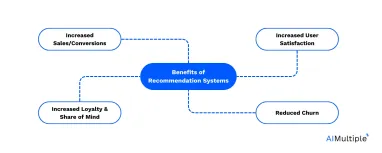
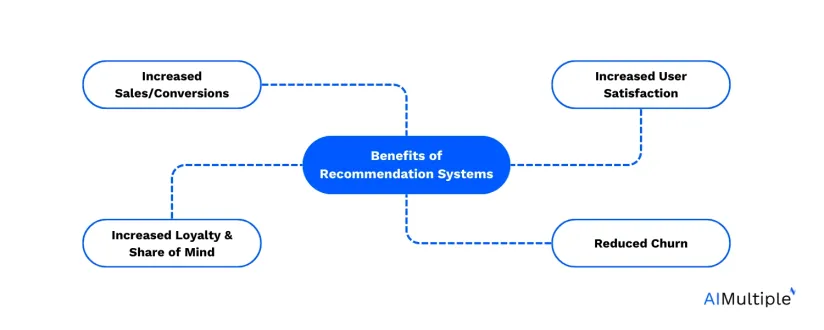
The recent global pandemic not only raised the demand for online shopping but also changed consumers’ behavior, as they required more personalized services from brands (Figure 1).
As the e-commerce industry grows, the demand for recommendation systems will grow with it. If you are planning to leverage recommendation systems to enhance your online store, keep reading.
In this article, we cover the following:
- What is a recommendation system, and how it works?
- Its benefits
- Top 6 industry applications/use cases
- Some case studies/examples
- Potential vendors
Figure 1. The importance of personalization in the post-pandemic market
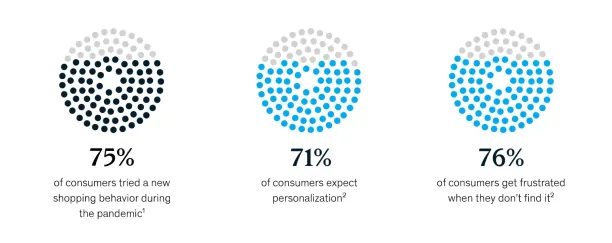
What is a recommendation system?
It is easy to get confused about recommendation systems as they are also sometimes called recommender systems or recommendation engines. All of these perform the same actions; they are systems that predict what your customers want by analyzing their behavior which contains information on past preferences.
How does it work?
Recommendation systems collect customer data and auto-analyze it to generate customized recommendations for your customers. These systems rely on both:
- Implicit data, such as browsing history and past purchases
- Explicit data, such as ratings provided by the user.
Content-based filtering and collaborative filtering are two approaches commonly used to generate recommendations. For more, please read the approaches section of our list of recommendation system vendors.
Benefits of recommendation systems
1. Increased sales/conversion
There are very few ways to achieve increased sales without increased marketing effort, and a recommendation system is one of them. Once you set up an automated recommendation system, you get recurring additional sales without any effort since it connects the shoppers with their desired products much faster.
2. Increased user satisfaction
The shortest path to a sale is great since it reduces the effort for both you and your customer. Recommendation systems allow you to reduce your customers’ path to a sale by recommending them a suitable option, sometimes even before they search for it.
3. Increased loyalty and share of mind
By getting customers to spend more on your website, you can increase their familiarity with your brand and user interface, increasing their probability of making future purchases from you.
4. Reduced churn
Recommendation system-powered emails are one of the best ways to re-engage customers. Discounts or coupons are other effective yet costly ways of re-engaging customers, and they can be coupled with recommendations to increase customers’ probability of conversion.
Applicable areas
Almost any business can benefit from a recommendation system. There are two important aspects that determine the level of benefit a business can gain from the technology.
- The breadth of data: A business serving only a handful of customers that behave in different ways will not receive many benefits from an automated recommendation system. Humans are still much better than machines in the area of learning from a few examples. In such cases, your employees will use their logic and qualitative and quantitative understanding of customers to make accurate recommendations.
- The depth of data: Having a single data point on each customer is also not helpful to recommendation systems. Deep data about customers’ online activities and, if possible, offline purchases can guide accurate recommendations
With this framework, we can identify industries that stand to gain from recommendation systems:
1. E-Commerce
Is an industry where recommendation systems were first widely used. With millions of customers and data on their online behavior, e-commerce companies are best suited to generate accurate recommendations.
2. Retail
Target scared shoppers back in the 2000s when Target systems were able to predict pregnancies even before mothers realized their own pregnancies. Shopping data is the most valuable data as it is the most direct data point on a customer’s intent. Retailers with troves of shopping data are at the forefront of companies making accurate recommendations.
3. Media
Similar to e-commerce, media businesses are one of the first to jump into recommendations. It is difficult to see a news site without a recommendation system.
4. Banking
A mass-market product that is consumed digitally by millions. Banking for the masses and SMEs are prime for recommendations. Knowing a customer’s detailed financial situation, along with their past preferences, coupled with data of thousands of similar users, is quite powerful.
5. Telecom
It Shares similar dynamics with banking. Telcos have access to millions of customers whose every interaction is recorded. Their product range is also rather limited compared to other industries, making recommendations in telecom an easier problem.
6. Utilities
Similar dynamics with telecom, but utilities have an even narrower range of products, making recommendations rather simple.
Examples from companies that use a recommendation engine
1. Amazon.com
Amazon.com uses item-to-item collaborative filtering recommendations on most pages of their website and e-mail campaigns. According to McKinsey, 35% of Amazon purchases are thanks to recommendation systems. Some examples of where Amazon uses recommendation systems are
2. Netflix
Netflix is another data-driven company that leverages recommendation systems to boost customer satisfaction. The same Mckinsey study we mentioned above highlights that 75% of Netflix viewing is driven by recommendations. In fact, Netflix is so obsessed with providing the best results for users that they held data science competitions called Netflix Prize where one with the most accurate movie recommendation algorithm wins a prize worth $1,000,000.
3. Spotify
Every week, Spotify generates a new customized playlist for each subscriber called “Discover Weekly” which is a personalized list of 30 songs based on users’ unique music tastes. Their acquisition of Echo Nest, a music intelligence and data-analytics startup, enable them to create a music recommendation engine that uses three different types of recommendation models:
- Collaborative filtering: Filtering songs by comparing users’ historical listening data with other users’ listening history.
- Natural language processing: Scraping the internet for information about specific artists and songs. Each artist or song is then assigned a dynamic list of top terms that changes daily and is weighted by relevance. The engine then determines whether two pieces of music or artists are similar.
- Audio file analysis: The algorithm each individual audio file’s characteristics, including tempo, loudness, key, and time signature, and makes recommendations accordingly.
4. Linkedin
Just like any other social media channel, LinkedIn also uses “You may also know” or “You may also like” types of recommendations.
Setting up a recommendation system
While most companies would benefit from adopting an existing solution, companies in niche categories or very high scale could experiment with building their own recommendation engine.
1. Using an out-of-the-box solution
Recommendation systems are one of the earliest and most mature AI use cases. As of Jan/2022, we have identified 10+ products in this domain. Visit our guide on recommendation systems to see all the vendors and learn more about specific recommendation engines.
The advantages of this approach include fast implementation and highly accurate results for most cases:
- Including a code snippet of the vendor can be enough to get started.
- Solutions tend to be accurate since vendors use data from thousands of transactions of their customers in an anonymized manner to improve their models.
To pick the right system, you can use historical or, even better, live data to test the effectiveness of different systems quickly.
2. Building your own solution
This can make sense if
- you are in a niche domain where recommendation engines were not used before or
- you own one of the world’s largest marketplaces where slightly better recommendations can make an important difference in your business outcomes.
Recommendation systems in the market today use logic like: customers with the similar purchase and browsing histories will purchase similar products in the future. To make such a system work, you either need a large number of historical transactions or detailed data on your user’s behavior on other websites. If you need such data, you could search for it in data marketplaces.
More data and better algorithms improve recommendations. You need to make use of all relevant data in your company, and you could expand your customer data with 3rd party data. If a regular customer of yours has been looking for red sneakers on other websites, why shouldn’t you show them a great pair when they visit your website?
3. Working with a consultant to build your own solutions
A slightly better recommendation engine could boost a company’s sales by a few percentage points, which could make a dramatic change in the profitability of a company with low-profit margins. Therefore, it can make sense to invest in building better recommendation engines if the company is not having satisfactory results from existing solution providers in the market.
AI consultants can help build specific models. We can help you identify partners in building custom recommendation engines:
If you want to learn more about custom AI solutions, feel free to read our whitepaper on the topic:
4. Running a data science competition to build your own solution
One possible approach is to use the wisdom of the crowd to build such systems. Companies can use encrypted historical data, launch data science competitions or work with consultants and get models providing highly effective recommendations.
Further reading
AI is not only applied to recommendation personalization. You can check out AI applications in marketing, sales, customer service, IT, data or analytics.
If you have any questions about recommendation systems, let us know:

Cem has been the principal analyst at AIMultiple since 2017. AIMultiple informs hundreds of thousands of businesses (as per similarWeb) including 60% of Fortune 500 every month.
Cem's work has been cited by leading global publications including Business Insider, Forbes, Washington Post, global firms like Deloitte, HPE, NGOs like World Economic Forum and supranational organizations like European Commission. You can see more reputable companies and media that referenced AIMultiple.
Throughout his career, Cem served as a tech consultant, tech buyer and tech entrepreneur. He advised businesses on their enterprise software, automation, cloud, AI / ML and other technology related decisions at McKinsey & Company and Altman Solon for more than a decade. He also published a McKinsey report on digitalization.
He led technology strategy and procurement of a telco while reporting to the CEO. He has also led commercial growth of deep tech company Hypatos that reached a 7 digit annual recurring revenue and a 9 digit valuation from 0 within 2 years. Cem's work in Hypatos was covered by leading technology publications like TechCrunch and Business Insider.
Cem regularly speaks at international technology conferences. He graduated from Bogazici University as a computer engineer and holds an MBA from Columbia Business School.
To stay up-to-date on B2B tech & accelerate your enterprise:
Follow on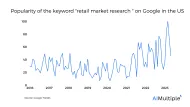
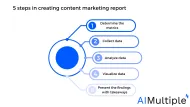
Comments
Your email address will not be published. All fields are required.